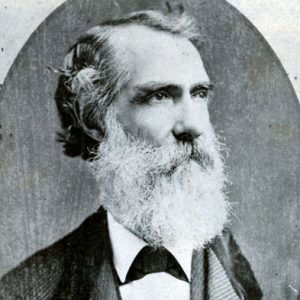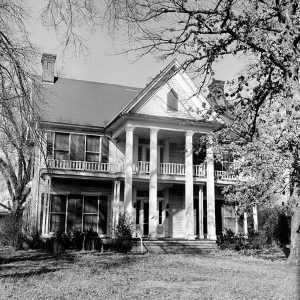calsfoundation@cals.org
Joseph William Bocage (1819–1898)
Judge Joseph William Bocage was a prominent pioneer settler of Pine Bluff (Jefferson County). He served as attorney for the Second Judicial District from 1844 to 1849 and as judge of the county court. In 1847, he prosecuted the first trial in Jefferson County to result in an execution. He was a successful planter, lumberman, inventor, manufacturer, and building contractor. Late in his life, he served as mayor of Pine Bluff.
Joseph Bocage was born on May 8, 1819, on the island of St. Lucia in the French West Indies. His father, William Coit Bocage, owned a large sugar and coffee plantation, a mercantile, and a shipping business. He died at the age of twenty-one, when Bocage was an infant. Bocage moved to the United States with his widowed mother, Marrie Ann (Lavoisier) Bocage, when he was three years old. She developed pneumonia and died shortly after landing in the United States, and Bocage was raised by a paternal cousin, Sarah Ann Lillington of Wilmington, North Carolina.
Bocage set out to make his fortune at the age of sixteen, settling in Arkansas. He arrived in Chicot County in 1836 and studied medicine there for one year. He abandoned medicine because, as one account reported, he became ill and imagined he had contracted all the diseases he had studied about in the medical journals of the day. He then relocated to Pine Bluff, which then consisted of only eight log houses and one frame dwelling. He studied law in the office of General James Yell and was admitted to the bar in 1840.
On May 21, 1840, Bocage married Frances Sanford Lindsey. The couple had thirteen children, only six of whom were living in 1881.
Among his many accomplishments, Bocage was county school commissioner and county treasurer for four years. On January 12, 1853, he and several other eastern Arkansas citizens secured the charter for the Little Rock and Napoleon Railroad. This was not a minor feat. The road bed for the rail track was nearing completion at the outbreak of the Civil War.
In April 1861, Bocage received a telegram from future general Thomas C. Hindman ordering him to capture the Silver Wave (probably actually the Silver Lake), which was loaded with arms and supplies on its way to Fort Smith (Sebastian County) via the Arkansas River. Bocage successfully took the boat. At the outbreak of the Civil War, he became captain of a local company he helped organize, the Southern Guards. He was instrumental in organizing the Second Arkansas Infantry Regiment (CS) and later appointed lieutenant colonel of the regiment.
Bocage and Hindman had many conflicts, and at one point Bocage told Hindman that he would seek a transfer of the Second Arkansas to Patrick Cleburne. In response, Hindman ordered the arrest of Bocage for insubordination. Bocage took his case along with witnesses to General William Joseph Hardee. Instead of an immediate transfer, Hardee ordered Bocage and his regiment to the Battle of Woodsonville in Kentucky.
Later, Bocage was transferred to Anderson County, Texas. He built up manufactories for cotton, wool, shoes, clothing, and nearly all army supplies for the Confederate army. Bocage surrendered to General Francis Herron at Shreveport, Louisiana, in 1865.
After the war, Bocage formed a partnership with Colonel Marcus L. Bell and actively engaged in rebuilding Pine Bluff. In connection with their sawmills and contracting, the firm erected an immense planing mill and sash door factory, which, together with a large lumber inventory, was entirely destroyed by fire in August 1873. One source reported that the uninsured loss was $60,000, or about $1 million in 2007 dollars.
Bocage built a steam brick factory and also a metal foundry that was the largest in the region. He held the patent for an improvement to the Jack Screw Press that improved cotton ginning. He was the only manufacturer of the “Wood Reversible Oscillating Steam Engine,” the invention of Augustus Wood of Ashley County. The local press lauded him by stating that both Pine Bluff and Jefferson County were indebted to him for their flourishing condition.
Bocage died January 14, 1898, and is buried in Bellwood Cemetery in Pine Bluff.
For additional information:
Biographical and Historical Memoirs of Central Arkansas. Chicago: Goodspeed Publishing Co., 1891.
Bocage, J. W. “Four Years Service during the Civil War.” Jefferson County Historical Quarterly 6.2 (1975): 34–43.
The Encyclopedia of the New West. Marshall, TX: U.S. Biographical Publishing Co., 1881.
J. W. Bocage Personal Letters and Papers. Jefferson County Library, Pine Bluff, Arkansas.
“Judge Bocage Dead.” Arkansas Gazette. January 15, 1898, p. 2.
Helen Pennington
Pine Bluff, Arkansas
 Du Bocage
Du Bocage Joseph Bocage
Joseph Bocage  Du Bocage
Du Bocage 



Comments
No comments on this entry yet.